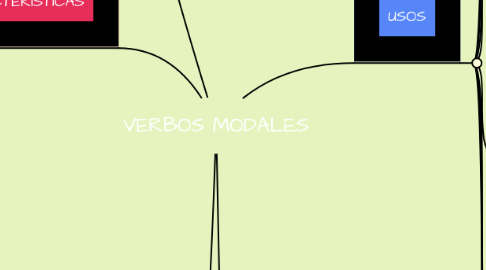
1. DEFINICION
1.1. son verbos auxiliares
1.1.1. Text book, exercises 34, 35, 36, 37
1.2. funciona como un verbo pincipal
1.3. expresa modalidad
1.4. habilidad, posibilidad, necesidad
2. CARACTERISTICAS
2.1. son una categoria
2.1.1. New vocabulary
2.2. verbos auxiliares
2.3. formar afirmaciones
2.4. no tienen conjugaciones
2.5. no se pueden usar sin verbo principal
2.6. tienen la misma forma
2.7. no adoptan terminaciones
2.8. como "- ed"
2.9. no presentan la forma -"ing"
2.10. no lleva "S" de 3ra persona del singular
2.11. funcionan como auxliares
2.12. "can I come?" delante del sujeto interrogativa
2.13. no pueden llevar "to"
3. EJEMPLOS
3.1. verbo Can
3.1.1. Poder
3.2. verbo Must
3.2.1. deber / obligacion
3.3. Verbo Minght
3.3.1. probablemente
3.4. Verbo Should
3.4.1. debería
3.5. Verbo Ought to
3.5.1. deberia
3.6. Verbo Be able to
3.6.1. poder o saber hacer algo para referirse al futuro
3.7. Verbo Could
3.7.1. podía / podría
3.8. Verbo Would
3.8.1. terminación en "RIA"
3.9. Verbo Have to
3.9.1. tener que
4. USOS
4.1. "Can"
4.1.1. verbo modal
4.1.2. significa
4.1.3. algo es posible (posibilidad)
4.1.4. verbo principal en su forma infinitiva
4.1.5. no tiene infinitivo
4.1.6. Forma Gramatical Afirmativa
4.1.6.1. I can play tennis
4.1.6.2. yo puedo jugar al tenis
4.1.7. Forma Gramatical Negativa
4.1.7.1. I can't go to the pary
4.1.7.2. Yo no puedo ir a la fiesta
4.1.8. Forma Gramatical Interrogativa
4.1.8.1. Can you come with us?
4.1.8.2. puedes venir tu con nosotros?
4.2. "Must"
4.2.1. verbo modal
4.2.2. no tiene infinitivo
4.2.3. tiene dos exepciones
4.2.3.1. indicar que estamos seguros
4.2.3.2. que algo sea cierto
4.2.3.3. "Must" indicar que es necesario
4.2.3.4. hacer algo
4.2.4. Estructura Gramatical Negativa
4.2.4.1. you mustn't go there
4.2.4.2. Tu no debes ir alli
4.2.5. Estructura Gramatical Afirmativa
4.2.5.1. you must answer the telephone
4.2.5.2. tu debes contestar el telefono
4.2.6. Estructura Gramatical Interrogativa
4.2.6.1. must you water the garden?
4.2.6.2. debes regar el jardin?
4.3. "Might"
4.3.1. puede utilizar "Might"
4.3.2. Estructura Gramatical Afirmativa
4.3.2.1. He may be at home
4.3.2.2. El puede estar en casa
4.3.3. Forma Negativa "Might not"
4.3.3.1. He might not be here
4.3.3.2. El podria no estar aqui
4.3.4. Estructura interrogativa "Might/ May"
4.3.4.1. might I open the door?
4.3.4.2. Podría abrir la puerta?
4.4. "should"
4.4.1. Indicar conveniencia
4.4.2. Estructura Gramatical Afirmativa
4.4.2.1. you should come with us
4.4.2.2. tu deberías venir con nosotros
4.4.3. Estructura Gramatical Interrogativa
4.4.3.1. should I go to the doctor ?
4.4.3.2. debería ir al doctor?
4.5. Could
4.5.1. podía / podría
4.5.2. pasado de can
4.5.3. Estructura Gramatical Afirmativa
4.5.3.1. I could talk louder.
4.5.3.2. Yo podía hablar más alto.
4.5.4. Estructura Gramatical Negativa
4.5.4.1. I couldn’t talk louder.
4.5.4.2. Yo no podía hablar más alto.
4.5.5. Estructura Gramatical Interrogativa
4.5.5.1. Could you talk louder?
4.5.5.2. Podrías hablar más alto?
4.6. Would
4.6.1. terminación Ria
4.6.2. Estructura Gramatical Afirmativa
4.6.2.1. I would like to buy a car.
4.6.2.2. Me gustaría comprar un coche.
4.6.3. Estructura Gramatical Negativa
4.6.3.1. I wouldn’t like to eat in this restaurant.
4.6.3.2. No me gustaría comer en este restaurante.
4.6.4. Estructura Gramatical Interrogativa
4.6.4.1. Would you like a cup of coffee?
4.6.4.2. Querrías una taza de café?
4.7. "ought to"
4.7.1. Deberia
4.7.1.1. they ought to work less
4.7.1.2. deberían trabajar menos
4.7.2. sinónimo de should
4.7.3. Forma Gramatical Afirmativa
4.7.3.1. You ought to finish your work
4.7.4. Forma Gramatical Negativa
4.7.4.1. you ought not to eat junk food
4.7.4.2. tu no deberías comer comida chatarra
4.8. "Be able to"
4.8.1. expresar habilidad
4.8.2. se utiliza cuando queremos decir
4.8.3. alguien es capaz de algo
4.8.4. Estructura Gramatical Afirmativa
4.8.4.1. I am able to play football
4.8.4.2. Yo estoy disponible a jugar futbool
4.8.5. Estructura Gramatical Negativa
4.8.5.1. She is not able to run fast
4.8.5.2. Ella no es capaz de correr rápido
4.9. "Have to"
4.9.1. obligación externa
4.9.2. no es un verbo modal
4.9.3. es un verbo principal
4.9.3.1. tu deberias terminar tu tarea
4.9.4. Estructura Gramatical Afirmativa
4.9.4.1. I have to clean my room
4.9.4.2. Yo tengo que limpiar mi cuarto
4.9.5. Estructura Gramatical Negativa
4.9.5.1. I don't have to study for my test
4.9.5.2. Yo no tengo que estudiar para mi examen
5. FORMAS GRAMATICALES
5.1. Forma Gramatical
5.1.1. + Verbo modal + Verbo Principal + complemento
5.2. Forma Negativa
5.2.1. + Verbo Modal + Not + Verbo Principal (infinitivo) + Complemento
5.3. Have To
5.3.1. + Do Does + Not + Have to + Verbo Principal + Complemento
5.4. Forma Interrogativa
5.4.1. Verbo Modal + Sujeto + Verbo Principal + Complemento + ?
